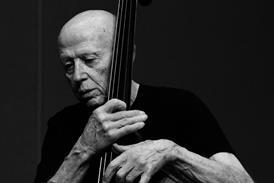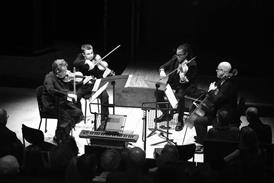
The Strad Issue: January 2008
Musicians: Cornelius Dufallo (violin) Yves Dharamraj (cello) Jenny Lin (piano)
Composer: Silvestrov
Where else would a postscript and an epitaph precede a drama? So strongly individual and oddly touching is the music of Valentin Silvestrov (b.1937) that the reversal works. A Ukrainian, he is another eastern European Minimalist, though not especially ‘holy’; if he has gods, they are likely to be Webern and Mozart. The latter is remembered in the deep-frozen conventions of Post-Scriptum (composed in 1990), which here receives its second recording. Cornelius Dufallo has not quite the bow control (perilously exposed by playing so quietly and so slowly for so long) of Alexander Trostiansky on ECM, and the pianist Alexei Lubimov uses a more playfully teasing variety of tone colour than Jenny Lin does here to bring to life an ambivalent homage to Classicism.
Silvestrov shares an elegiac tendency with his contemporaries Giya Kancheli and Arvo Pärt that can become maudlin. The ten-minute Epitaph for cello and piano is one of several works Silvestrov composed in memory of his wife Larissa, who died in 1999; perhaps there is a fresh desolation that scores over the more weightily pondered Requiem for Larissa, but I hazard that the phrases, at least as played by Yves Dharamraj, are too short-winded to carry lasting weight or impact.
Nevertheless, Silvestrov distinguishes himself with the sharpness of his ears and the freshness of his thinking. The loving adieus of his later music came about through an immersion in the Western avant garde, with Webern as the fountainhead, which unlike Pärt he has not so much disowned as refined. This makes the 45-minute, tripartite Drama for piano trio (1971) a vitally important work, all the more so in this its first recording. For all the prepared-piano sonorities, plucked glissandos and serial harmonies and procedures, the frequency and expressive richness of the gestures create a strong sense of continuity. Played with commendable dedication and a fine awareness of sense and poetry – as it is here – it compels attention.
Peter Quantrill
































No comments yet